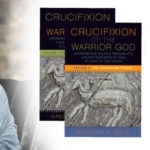We run our website the way we wished the whole internet worked: we provide high quality original content with no ads. We are funded solely by your direct support. Please consider supporting this project.

Yahweh as the Dark Knight
I recently received an interesting analogy for The Crucifixion of the Warrior God from Aaron Reini. Thank you Aaron!
In the final scene of “The Dark Knight,” Batman and Commissioner Gordon are standing over Harvey Dent, whom everyone in Gotham City looks up to as a hero, but whom the Joker had turned into a secret villain appropriately named “Two Face.” Batman and Gordon have just learned that Dent is responsible for a trail of destruction and the death of five citizens. Yet, if the citizens of Gotham discover the tragic truth about Dent’s villainous identity, it will unravel all the good work that had been done in his name and could have dire consequences for the city.
Then Batman has an idea. Watch the scene above.
Awesome, heh? Because Batman sees that the citizens of Gotham City need to believe Dent was a hero, and because he is willing to appear to be “whatever Gotham needs me to be,” Batman, who is Gotham City’s real hero, is willing to take on the appearance of the villain who carried out the atrocities that Dent brought about. In short, Batman’s love for his people leads him to appear guilty of Dent’s crimes and to thus become Gotham City’s Dark Knight.
The analogy of course isn’t perfect (analogies never are), but it captures an important aspect of my thesis in Crucifixion of the Warrior God. Like Batman, the cross reveals a God who has always been willing to appear to be whatever his fallen people need him to be. His love for his people, and his refusal to coerce people into embracing true conceptions of him, frequently led God to appear guilty of crimes that were actually committed by other human or angelic agents.
For example, when his fallen and culturally conditioned people needed to believe Yahweh demanded and enjoyed animal sacrifices, Yahweh humbly stooped to allow them to view him this way, which is why he takes on the appearance of a typical ANE sacrifice-demanding deity within the biblical narrative.
So too, when his people proved incapable of trusting a God who could accomplish his goals non-violently and needed to instead believe Yahweh was a more ferocious violent warrior god than the gods of the other nations, Yahweh humbly stooped to take on the appearance of a rather typical ANE warrior deity who commands and engages in violence. All the violence that OT authors ascribe to Yahweh was actually carried out by human or angelic agents, as their own writings usually make clear. But his ancient people weren’t yet in a place where Yahweh could free them from their assumption that attributing violence to God is the highest form of praise. And so God bears their sinful conception of him and thus takes on an appearance that reflects the ugliness of this sin.
In short, the cross is the quintessential expression of God as our dark knight. To be the loving knight who watches over us and saves us, he must, like Batman, be willing to take on appearances that are acclimated to our darkness.
Ps. If you have other good movie or literary analogies that illustrate the thesis of Crucifixion of the Warrior God, I appreciate seeing them. Please send them to editor@reknew.org. At some point down the road I’d like to compile them into a single resource for people to view.
Pss. Nanny McPhee is already taken. ;-)
Category: General
Tags: Character of God, Crucifixion of the Warrior God, Cruciform Theology
Topics: Attributes and Character
Related Reading

Podcast: By Celebrating Passover, Isn’t Jesus Tacitly Approving the Sacrificial System Passover Was Based On?
Is Jesus for or against slaughtering babies? Greg talks about exodus and sacrifice. http://traffic.libsyn.com/askgregboyd/Episode_0405.mp3

Podcast: What is Crucifixion of the Warrior God?
In this 100th episode Greg gives us a peek at Crucifixion of the Warrior God. Pre-order your copy of the book here: The Crucifixion of the Warrior God: Volumes 1 & 2 (Fortress Press, 2017) http://traffic.libsyn.com/askgregboyd/Episode_0100.mp3

Cruciform Aikido Pt 1: Jesus and the Violent God
Note: Today, we are beginning a 4-part series on the subject of divine judgement called “Cruciform Aikido.” We will be publishing this once a week alongside Greg’s introduction to ReKnew series. When most people think of God judging sinners, they imagine an angry God who acts violently as he vents his wrath and brings vengeance on people.…

Do We Read Bible-Violence to Children? (podcast)
Greg on children and Bible violence. Episode 658 http://traffic.libsyn.com/askgregboyd/Episode_0658.mp3

An Alternative to Biblical Inerrancy
As with all other theological issues, when it comes to affirming that Scripture is “God-breathed,” everything hangs on where one starts. A dominant strand of the Evangelical tradition started with the assumption that, if God is perfect, and if Scripture is “God-breathed,” then Scripture must also be perfect or “inerrant.” Other “progressive” evangelicals have responded by…

Podcast: Was it God Who Sent the Plagues in Exodus?
Greg discusses how God’s restraint from action is often written as an act (rather than a non-act). http://traffic.libsyn.com/askgregboyd/Episode_0075.mp3
